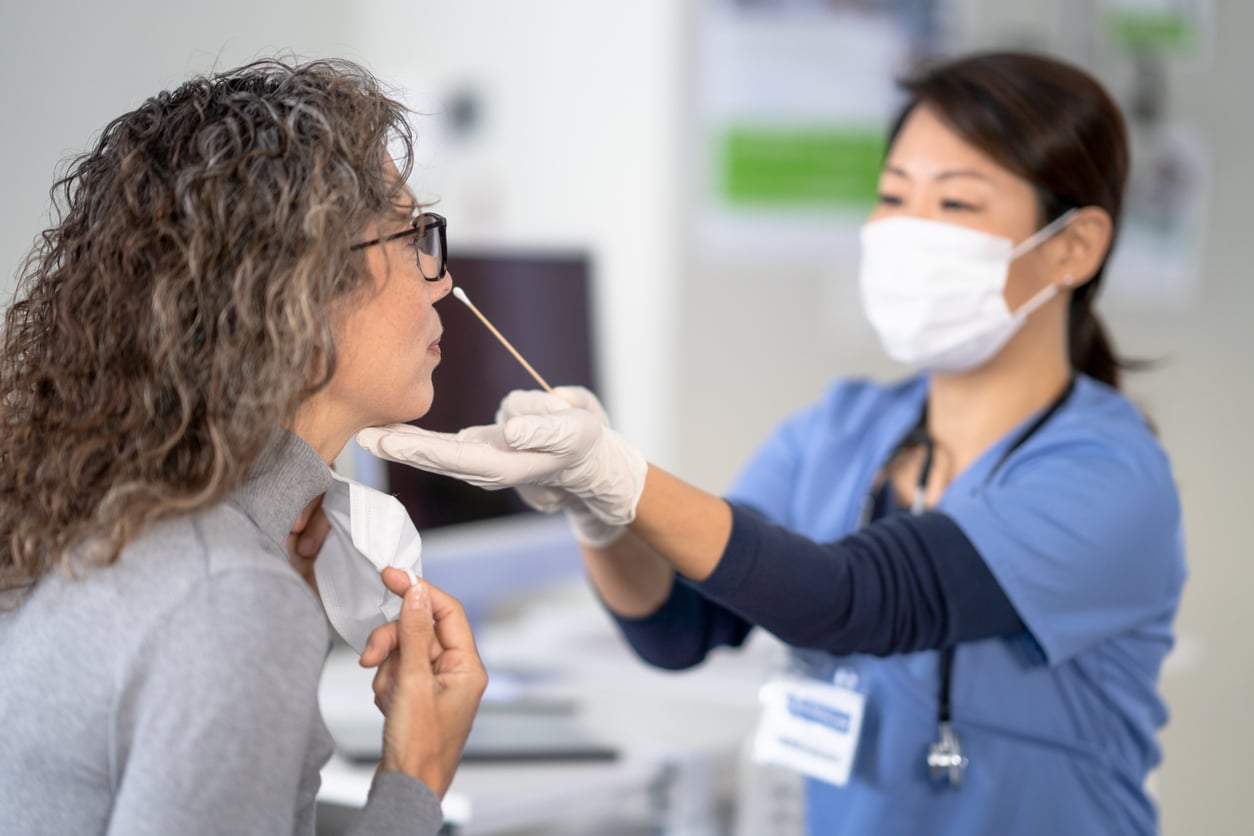PCR vs. Rapid Test for COVID-19: What Is The Difference?

In the ever-evolving landscape of COVID-19 testing, two primary methods have taken center stage: Polymerase Chain Reaction (PCR) tests and Rapid Tests. These testing approaches are different in their mechanisms, advantages, and cons. In this comprehensive guide, we’ll discuss both PCR and Rapid Tests, exploring what makes a COVID-19 test accurate and discussing optimal testing scenarios for asymptomatic individuals.
What is a PCR Test?
A Polymerase Chain Reaction (PCR) test is a molecular diagnostic method used to detect the presence of genetic material from the SARS-CoV-2 virus, which is responsible for COVID-19. This testing technique amplifies and analyzes specific segments of the virus’s genetic material, providing a highly accurate and sensitive means of identifying an active infection.
It’s important to note that PCR tests are valuable for accurate and early detection but may have a longer turnaround time compared to rapid testing methods.
Pros
- High Accuracy: PCR tests are renowned for their accuracy in detecting the genetic material of the virus, providing reliable results even with low viral loads.
- Early Detection: Particularly effective during the early stages of infection when viral loads are lower.
- Wide Acceptance: PCR tests are widely accepted as the gold standard for COVID-19 diagnosis.
- Versatility: PCR tests can detect the virus’s presence even before symptoms appear, making them suitable for asymptomatic individuals.
Cons
- Longer Turnaround Time: PCR tests typically require processing in a laboratory setting, leading to a longer turnaround time for results, often taking a day or more.
- Cost: Due to laboratory requirements to process the PCR test, there may be additional costs required for a PCR test. At AllCare, we often start with a rapid test for most patients.
What is a COVID-19 Rapid Test?
A Rapid Test, also known as a rapid antigen test, is a diagnostic method used to quickly detect the presence of specific proteins on the surface of the SARS-CoV-2 virus, the causative agent of COVID-19. Unlike PCR tests, which identify the virus’s genetic material, rapid tests provide results in a shorter time frame and are often administered at the point of care.
It’s important to note that while rapid tests offer speed and convenience, they may have slightly lower sensitivity compared to PCR tests.
Pros
- Quick Results: Rapid Tests provide results within minutes, making them ideal for swift identification of potentially contagious individuals.
- Point-of-Care Testing: These tests are often conducted at the point of care, such as testing sites or healthcare facilities, without the need for specialized laboratory processing.
- Convenience: The speed of Rapid Tests allows for rapid decision-making regarding isolation and treatment.
- Ease of Use: Rapid Tests are user-friendly, often requiring minimal training for healthcare professionals conducting the tests.
- Cost: These are usually less costly than PCR tests.
Cons
- Lower Sensitivity: Rapid Tests may have lower sensitivity compared to PCR tests, making them more prone to producing false-negative results, especially in individuals with lower viral loads.
- Symptom-Dependent Accuracy: Rapid Tests are most effective when administered during the symptomatic phase when viral shedding is at its peak.
What Makes a COVID-19 Test Accurate?
The accuracy of a COVID-19 test depends on its sensitivity and specificity. Sensitivity measures the test’s ability to correctly identify individuals with the virus, while specificity gauges its ability to correctly identify those without the virus. Both PCR and Rapid Tests undergo stringent validation processes to ensure their accuracy in real-world scenarios.
PCR tests are particularly effective in detecting the virus’s genetic material, making them highly sensitive. Rapid Tests, while offering quick results, are more suitable for individuals exhibiting symptoms.
When Should You Test If You Don’t Have Symptoms?
Timing is crucial when considering COVID-19 testing, especially if you’re asymptomatic. If you’ve been exposed to someone with COVID-19 or have been in a high-risk setting, it’s advisable to wait a few days post-exposure before getting tested. Wait at least 2 full days after your exposure before taking a test. This allows the virus to reach detectable levels in your system, increasing the likelihood of an accurate result. Remember that even if your test turns negative, it’s less reliable since there aren’t symptoms, which is why it may be helpful to repeat the test after 48 hrs or if you develop symptoms.
Where to Find a COVID Test?
Various options are available if you’re in need of a COVID-19 test. Healthcare facilities like AllCare, testing sites, and pharmacies often offer both PCR and Rapid Tests. Local health departments may also provide testing services. Choosing a reputable testing site is crucial for accurate and reliable results.
Get Tested for COVID-19 at AllCare
Our dedicated healthcare professionals prioritize your safety and well-being, offering both PCR and Rapid Tests, we provide comprehensive testing services to help you make informed decisions about your health when talking about COVID-19. Whether you need quick results or the utmost accuracy, AllCare has you covered. Schedule your COVID-19 test with us today, and take proactive steps to protect yourself and those around you.